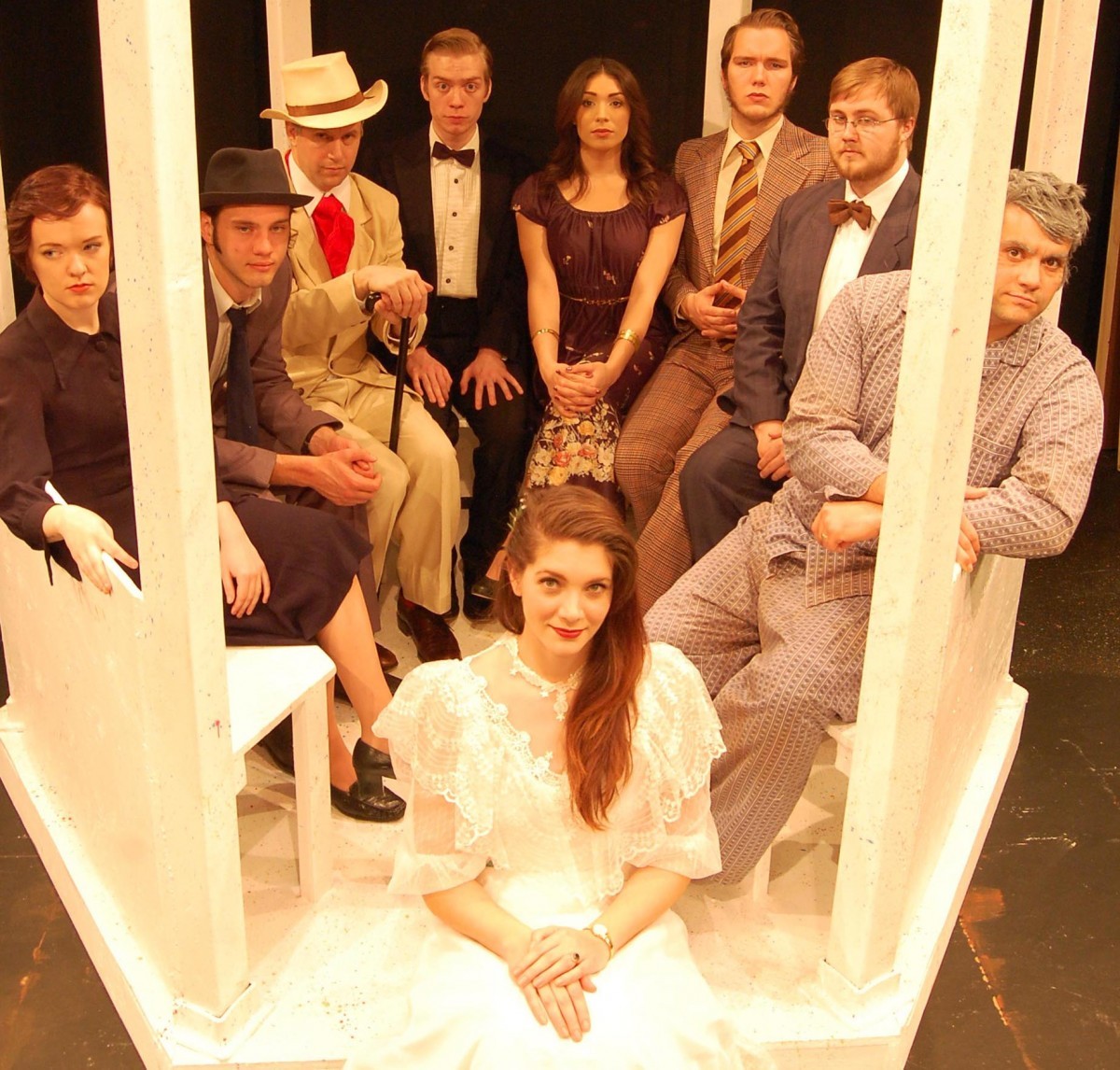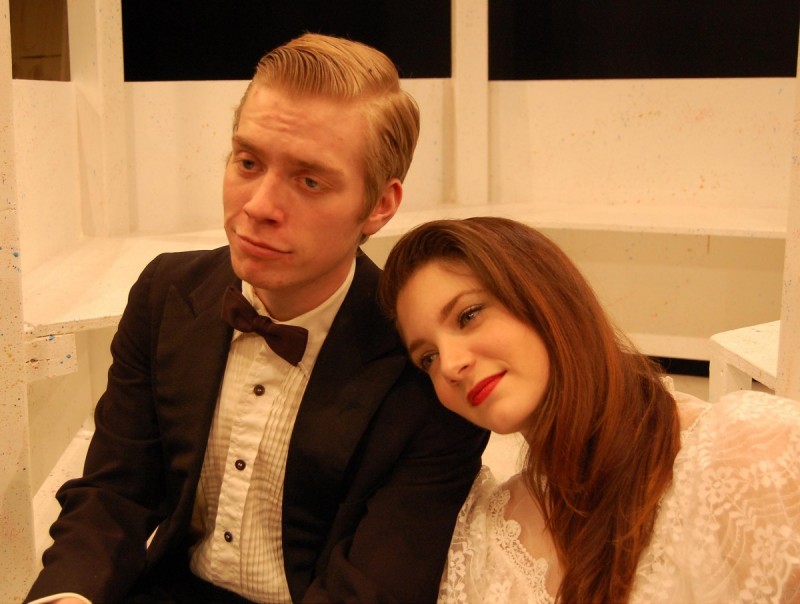
L to R: Sydney Wiebe, Brennan Hakes, Ian Bastin, Logan Stefanson, Jeysa Martinez-Pratt, Brandon Vink, Ryan Bjornson, Graham Atnip, and at the bottom Natashia Durand.
Yearning for elsewhere: Black Hole play part of Chekhov Fest
Chekhov-influenced The Aristocrats runs until Sunday
Infused with melancholy, The Aristocrats features a dysfunctional family reunion that anticipates a wedding and turns into a funeral. A brother and three of four sisters reunite at the grand but crumbling O’Donnell home, which gives a glimpse into a previous era of this Northern Irish family dynasty. There, they are vexed by the family patriarch, a former District Judge — languishing and gravely ill but present onstage in the form of his disembodied voice booming commands and judgements over an intercom.
The play is being presented by U of M’s Black Hole Theatre Company all this week.
Playwright Brian Friel described the subject matter of his play as “family life, its quality, its cohesion, its stultifying effects, its affording of opportunities for what we designate ‘love,’ ‘affection,’ ‘loyalty.’ Class politics, social aspiration, are the qualifying decor but not the core.”
A play about “family life, its quality, its cohesion, its stultifying effects, its affording of opportunities for what we designate ‘love,’ ‘affection,’ ‘loyalty.'”
When director William Kerr heard that MTC’s master playwright festival would feature Chekhov this year, he thought immediately of Friel’s The Aristocrats (1979). It was the perfect entry for U of M’s Black Hole Theatre Company as part of Chekhov Fest.
Recognized as Ireland’s greatest living playwright, Friel is known for his Chekhovian style. So much so that Friel, now in his mid-eighties, adapted several Chekhov plays and has written a short play, Afterplay (2002), which features characters from Chekhov’s Three Sisters meeting again after 20 years.
The Aristocrats is very close in structure to Chekhov’s Three Sisters, notes Kerr. Friel is an inheritor of Chekov’s ability to “imbue the seemingly mundane with such power,” he adds. Having done extensive study on Friel’s work, Kerr, who is an associate prof in the department of English, film and theatre, Faculty of Arts, feels that it’s “his most Chevhovian” play.
Friel is an inheritor of Chekhov’s ability to “imbue the seemingly mundane with such power.”
Friel’s plays evince concern for the off-centre and the marginal, says Kerr; he “gets inside characters in rural [settings] in the same way Chekhov does, characters in places that are off the centre and yearning for elsewhere.
“He has that kind of kinship [with Chekhov].”
Though he is a political playwright, many of those politics are “underground,” as Friel puts it. The playwright kept an occasional diary while writing The Aristocrats. “The play that is visiting me brings with it each time an odour of musk — incipient decay, an era wilted, people confused and nervous. If there are politics they are underground,” he wrote.
According to Kerr, this “odour” of memory — a whiff of decay — and an exquisite attention to language figure prominently in many of Friel’s plays.
According to Kerr, this “odour” of memory — a whiff of decay — and an exquisite attention to language figure prominently in many of Friel’s plays.
In fact, it was Friel’s facility with language, and the cross-germination between the literary and theatrical, that initially attracted Kerr to his work — and kept drawing him back. Eventually he did interdisciplinary graduate work on Friel.
As Kerr explains, “Friel is at the crossroads of these [literary and theatre] interests, as his plays harken back to the textual and more literary works of playwrights like Chekhov or Ibsen (or Synge, or O’Casey) — but they also incorporate the theatrical ruptures of the 20th century: the influences of Brecht and Artauld, of the Absurd; in short, of the anti-illusionistic theatrical practices.
In his work, Friel, who started as a short story writer, “includes the wrestling with the ability to communicate that animates those experimental [theatre] practices,” Kerr continues.
“I am most fascinated by the ways in which he attempts to bridge that gap by adding the possibilities of the theatrical to the strivings of the literary. For me, Friel was the first playwright I could read again and be excited by who was so literary and often (at least seemingly) illusionistic, working in and through naturalism after I read and worked on [more experimental playwrights such as] Beckett, Pinter, Genet, Churchill, and so on.
“The Irish playwright and critic Dennis Johnston said of of Friel’s Philadelphia, Here I Come! that it was “like Waiting for Godot with tickets to Philadelphia!” — and I think that sums it up,” he laughs.
The Aristocrats, presented by U of M’s Black Hole Theatre Co. is part of Chekhov Fest and continues until Sunday, February 2 at the Gas Station Theatre, 445 River Avenue. For showtimes and tickets, see here.
The Aristocrats is about decay, about a dying remnant of a dying remnant. The remaining members of an Irish Catholic Aristocratic family, the O’Donnells, try to hold on to their past, their inheritance, in the face of a relentless present.







